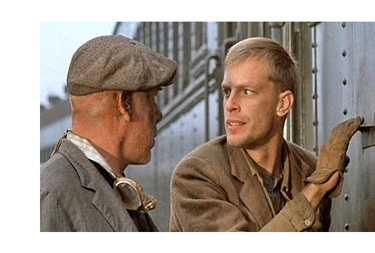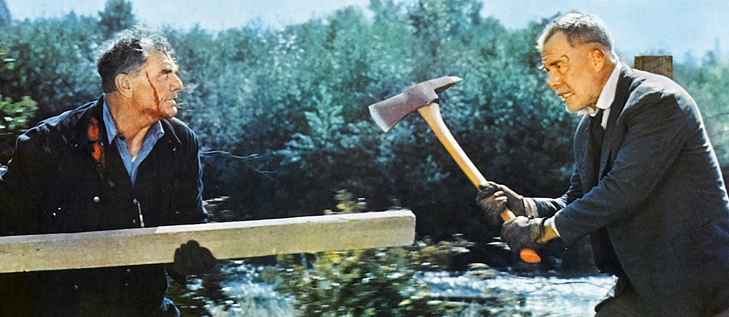Emperor of the North
What would seem the perfect project for tough-guy director Robert Aldrich still commands a high reputation with some. Ambitious top-dog hobo Lee Marvin squares off against Ernest Borgnine’s nearly demonic railroad conductor who routinely murders bums that dare to hitch a ride. The mayhem culminates in a battle on a moving flat car, between Ernie’s log chain and Lee’s fire ax. But the poetic dialogue and allegorical pretension may be more lethal.

Emperor of the North
Blu-ray
Twilight Time
Limited Edition
1973 / Color / 1:85 widescreen / 120 min. / Ship Date September 8, 2015 / available through Twilight Time Movies / 29.95
Starring Lee Marvin, Ernest Borgnine, Keith Carradine, Charles Tyner, Malcolm Atterbury, Simon Oakland, Harry Caesar, Hal Baylor, Matt Clark, Elisha Cook Jr., Joe Di Reda, Liam Dunn, Diane Dye, Robert Foulk, Sid Haig, Vic Tayback, Dave Willock, Lance Henricksen.
Cinematography Joseph Biroc
Art Direction Jack Martin Smith
Film Editor Michael Luciano
Original Music Frank De Vol
Written by Christopher Knopf from short stories by Jack London
Produced by Stan Hough
Directed by Robert Aldrich
Robert Aldrich put ambitious plans in motion after the great success of his The Dirty Dozen, buying a film studio of his own and trying to make a go at being a mini-mogul. When that didn’t work out, Aldrich still never gave up making movies that personally excited him, that pushed the edge of the envelope. Like many directors, he saw the walls of censorship falling with the Production Code and made the most of the new freedom with films like The Legend of Lylah Clare, The Killing of Sister George and The Grissom Gang. What Aldrich lacked in finesse he compensated for with sheer guts — after two nearly absurd hours of Lylah Clare, he ends that film with as savage a ‘director’s statement’ as one could make in Hollywood. His last western Ulzana’s Raid (why haven’t I reviewed that?) is possibly his last masterpiece. It’s one of the few westerns that gets the violence just right – scary and uncompromised.

More flops would follow, good movies and bad, but another monster hit in The Longest Yard put the director over the top once again. One Aldrich project that seemed a winner going in was 1973’s Emperor of the North. A gritty chronicle of rough men in brutal times, it would seem perfect material for him. Alas, as much we admire Robert Aldrich, in this show his weaknesses overcome an impressive production, with committed performances from a well-chosen cast.
The film creates a folk mythology around a phenomenon of pre-war America, when hobos rode the railways seeing work or a handout. In the great Northwest of Oregon, the efforts of the trainmasters to keep unwanted riders off the freight trains have become a violent game. A hobo champion, “A No. 1” (Lee Marvin) faces off against a railroad conductor, Shack (Ernest Borgnine). Shack is so obsessed with his sense of power and pride the he violently ejects riders, and when he can get away with it, murders them. When A No. 1 swears to ride Shack’s train through the high country all the way to Portland, bets go down in all the rail stations and hobo encampments. Complicating the competition is a young punk, Cigaret (Keith Carradine), a braggart who makes false claims of his experience and accomplishments in defying the railroad bulls. A No. 1 is at first contemptuous of Cigaret, but then takes him in as a potential partner, at least while he’s of use. There are no restraints on Shack’s ability to take personal revenge. On the long runs through the deep woods he’s the only law. Shack’s own engineer and fireman (Malcolm Atterbury & Harry Caesar) don’t intervene, even when they see him committing outrageous murders.

Emperor of the North isn’t an exposé of real conditions during the Depression; the best film for that is in William Wellman’s Wild Boys of the Road. Although based on stories by Jack London, it doesn’t attempt London’s journalistic approach. In an earlier time London bummed his way across the U.S. and Canada, sneaking aboard trains guarded by employees that used clever tricks to detect and eject ‘casual’ riders. It could be a life or death proposition depending on the temperament of the railroad crews. One could be abandoned deep in the wilderness, forty miles between stops, to die of exposure. London relates some fearful incidents, but also tells stories of kindnesses and camaraderie among the vagabonds.
Aldrich’s screenwriter Christopher Knopf (20 Million Miles to Earth) writes the story as a violent fantasy with legendary overtones. Just as some earlier Aldrich movies use classical allusions, Emperor goes for grandiose overstatement. The arty-folksy approach comes with overdone speeches that would make Eugene O’Neil cringe:
“You ain’t stopping at this hotel, kid. My hotel! The stars at night, I put ’em there. And I know the presidents, all of them. And I go where I damn well please. Even the chairman of the New York Central can’t do it better. My road, kid, and I don’t give lessons and I don’t take partners. Your ass don’t ride this train!”
It’s the hobo equivalent of bad beat poetry. Fox’s marketers were surely spooked by the film’s odd pitch. The original title was ‘Emperor of the North Pole,’ a script quote referring to the empty honor Marvin would achieve by riding Shack’s train. They should have just called the movie “Log chain vs. Fire Axe” and let it play as a pure blood ‘n’ gristle action meat grinder.

To finish up the pretension angle, it’s not flattering that Emperor of the North seems oblivious to the classic Preston Sturges comedy Sullivan’s Travels. It opens with a lampoon of a ‘meaningful’ art film about ‘grim death gargling in our faces’ (para.). Two lumpen thugs called “Labor” and “Capital” battle to the death atop a train rushing through the night. ‘It’s the eternal struggle!’ The idea of Ernest Borgnine and Lee Marvin swinging lethal weapons at each other sounds like something worth checking out. Forcing mythical meanings into the mix, with dialogue full of deep-dish existential resonance, doesn’t inspire admiration.
With his go-to-hell attitude and sloppy appearance, Lee Marvin hits most of the right notes. He even gets away with some of the fifty-dollar oratory. He was phenomenally good with the stylized speeches of The Iceman Cometh, made the same year with Robert Ryan. Keith Carradine is a mess. He seems natural whenever he works for Robert Altman, but here his every line reading just comes out false. I don’t believe Cigaret for a minute, and it seems wrong when anybody in the movie pays him any mind either.
Finally, Ernest Borgnine is a real problem. He was a hit-or-miss for Aldrich, who cast his pictures well but let certain actors fly totally off the handle. Borgnine is almost always Too Much when acting for Aldrich,

as if he’s begging to be reined in and doesn’t get the direction he needs. We love Ernie but his is the only character in the superb The Flight of the Phoenix that plain doesn’t work. He’s refreshingly restrained in a relatively small part in The Dirty Dozen, and okay in Lylah Clare, where he plays a bizarre version of Aldrich himself. In Emperor, Borgnine seethes with anger as an almost unchanging condition. For at least half of the movie he grits his teeth, his face set in a snarl so fierce that it looks like his eyes will fall from their sockets. After a few seconds he starts looking funny, not scary. I’m always impressed to see any actor working around a real, moving train — there’s a hundred ways to get killed, with just a small miscalculation. But no train crew would have tolerated Ernie Borgnine’s Shack. When he goes nuts in the cab of the locomotive, he just seems like an idiot. It’s like Charlie Manson showing up as a co-pilot for United Airlines.
The same thing happens with the overstated violence. Aldrich whips up a pretty rough fight for the finish, with people breaking ribs and actually landing axe blows. But it’s less a battle royale than a Grand Guignol exhibition. If anything the actors look slightly too old for the rough action. None of it is as effective as an opening bit of violence suffered by an unlucky rail-rider. That has the mechanized-mayhem feel of the Mad Max movies.
Aldrich gathers a huge supporting cast of interesting actors. Each gets a privileged moment but rarely more than that. All seem directed to pitch their characters to the last rows of the theater. It’s like Aldrich wanted to round up 25 swell guys for a great beer party in the Oregon woods: John Steadman, Charles Tyner, Hal Baylor, Liam Dunn, Elisha Cook Jr., Vic Tayback and Dave Willock. Favorite Matt Clark makes a good impression as a sad sack who wants to keep his job, while fringe personality Sid Haig is an equal standout with only a few seconds of screen time.

The film gives us a lot of opportunity to observe the railroad hardware in action. Although Aldrich went to the trouble to make an oil-fed locomotive seem to be running on coal, he doesn’t achieve the sense of reality on the rails that we get in Frankenheimer’s The Train or even Keaton’s The General. Trains appear to spur off without switches being thrown. Too many hobos leap onto cars in plain sight, without being seen. The most common weirdness is someone jumping aboard a moving train, riding for ninety seconds, and falling or being pushed off. More often than not, they don’t seem to have been carried very far from where they boarded.
This is a period picture, but Aldrich isn’t interested in period atmosphere beyond some costumes and dialogue choices. Marty Robbins’ title song belongs in a ‘good old boy’ epic, and the picture is packed with aerial shots combined with camera zooms.

Maybe things were different out in the wilds of Oregon, but I also challenge the characterization of the railroad men. They all seem nearly destitute, almost as broke as the bums. My grandfather worked as a railroad man back in Iowa and Minnesota, from around 1912 to 1950. The railroad jobs were Union jobs. My father’s family wasn’t wealthy, but during the Depression the steady salary made them preferred customers, courted by the merchants. My grandmother, a Norwegian nurse who boiled everything, made sure my father had a new suit and good shoes at all times. The steady pay built up a great sense of company loyalty; there was little shirking of duty.
Finally, there’s a problem of basic relevance. If the show were just about two maniacs battling on a flat car, I’d have no argument. But the real violence of the times had to do with the suppression of strikes and other labor problems – a grave social struggle that’s just as crucial to American life now as it was then. It’s not fair to tell Emperor to take sides, but its chosen fantasy is both irrelevant and somewhat foolish. It’s not Jack London’s vision of the rails either. Perhaps the right person to film this story would have been John Sayles – who would have downplayed the violence.
The show does indulge in some weak ‘liberal’ relevance. As good as it is to see actor Harry Caesar as Shack’s fireman, the rail unions of the 1930s, as explained to me by my father, were as racist an organization as one can think of. Blacks were porters but not much else. I’m a generation removed from the reality, but these are the impressions I was given. Emperor of the North has some energizing violence and maybe twenty minutes of engaging reversals in the competition between Shack and A No. 1. But it has no relation that I can see to any meaningful reality, and its pretensions toward a bigger relevance fall limp.

The Twilight Time Blu-ray of Emperor of the North is a sparkling, gorgeous transfer — I had no idea this picture looked so good. Joseph Biroc’s camerawork is always a treat for the eyes. During the big fight we almost expect Borgnine and Marvin to interrupt their biting and gouging to stare at the knockout scenery, and say, “Gee whiz.” If you remember enjoying this movie, TT’s disc is going to be a real treat. Frank DeVol’s music is given its own Isolated Score Track, Twilight Time’s most consistent extra.
Film historian Dana Polan gives an academic commentary track repurposed, I’m fairly sure, from the older DVD. It analyzes Emperor of the North in terms of author’s themes, complete with explanations of deeper meanings in the visuals. I readily accept this kind of analysis for older, more stylized pictures, so why not for this one? We’re also given some TV spots and a trailer that doesn’t raise the blood pressure as much as it should. This is the kind of picture that needed a tease campaign, as worked so well for Aldrich in the 1960s. Just a few seconds of Borgnine’s grinning goblin swinging his chain is enough to satisfy our curiosity.
TT’s liner essayist Julie Kirgo lauds Aldrich’s career accomplishments — which are indeed substantial — and gives us more background information. We find that Emperor of the North was not a project initiated by Aldrich. He picked it up after others, including Sam Peckinpah, turned it down. Then riding high & wide and totally out of control, Peckinpah’s salary demands scared off the studio bean counters.
Reviewed by Glenn Erickson
Emperor of the North
Blu-ray rates:
Movie: Good but iffy
Video: Excellent
Sound: Excellent
Supplements: Commentary by Dana Polan, Isolated Score Track, trailer and TV spots, Julie Kirgo liner notes
Deaf and Hearing Impaired Friendly? YES; Subtitles: English
Packaging: Keep case
Reviewed: September 21, 2015
Text © Copyright 2015 Glenn Erickson





